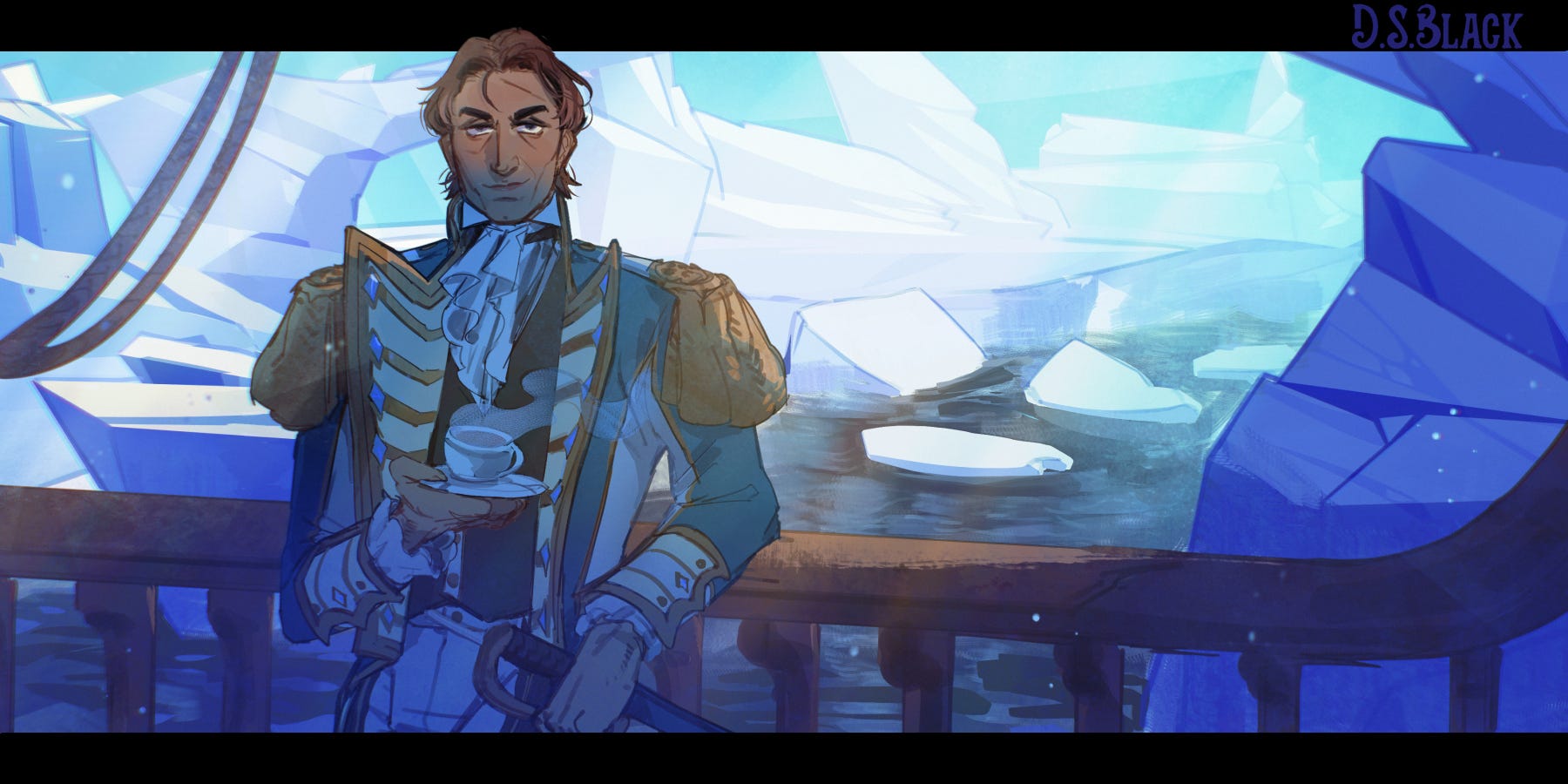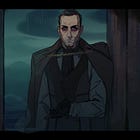Captain Henry Somerset is a problem the Arunean Admiralty cannot solve.
He’s a commoner who commands like he was born to it. A war hero whose methods are borderline heretical. A man who wins battles by listening to the sea that should be driving him mad. They can’t promote him further without legitimizing his unorthodox tactics. They can’t dismiss him without losing one of their most effective captains. So they resent him, fear him, and pray the Fathom takes him before he shatters every tradition the Navy was built on.
This is a dossier on the man they call the “Witch-Captain”—and why his greatest battle isn’t with enemy ships, but with the sentient ocean that grants him his power.
Dossier: Captain Henry Somerset
Designation: Post-Captain, Arunean Navy; Commanding Officer, frigate Siren's Reply Known Alias: The Witch-Captain of the Reply
Appearance & Demeanor: Somerset has a compact, powerful build honed by a lifetime at sea, yet he moves with an innate, predatory grace that belies his common birth. His features are sharp and intelligent, framed by a perpetually unkempt mane of rich, copper-brown hair. A thin, silvered line bisects his forehead, a quiet testament to a life of violence.
His defining feature is his charm—and it’s a lie. He wields a roguish smirk and easy laugh like weapons, tools to disarm rivals and inspire loyalty. The performance is flawless until you catch his storm-grey eyes in an unguarded moment: distant, haunted, fighting a war no one else can see.
Watch him work:
The fog was an oppressive, living thing, its tendrils clinging with a damp chill that had nothing of the sun's mercy in it. It tasted of salt and envy.
His First Lieutenant, Ladon Vance, moved to his side. "She has a grasping mood this morning, Captain," Vance rumbled, his voice low. "The whispers are finding purchase in the quiet hours."
Somerset took the offered mug of tea, its heat a welcome, grounding reality. His lips twisted into a wry smile that did not quite reach his eyes. "Then we'll give the men something louder to listen to," he said, his voice carrying with a theatrical lightness. He turned his back on the spurned sea. "Mister Vance, beat to quarters. I want a live fire drill, starboard battery. Let's sing her a song of our own this morning."
Somerset’s "witchcraft" is not a gift; it is a trauma. He survives not by blocking out the Fathom's song, but by listening to it, treating the abyss like a jealous, powerful, and hateful lover. This constant mental duel is the source of his preternatural intuition at sea and his deepest torment.
This very intuition is what makes him such a threat to the Arunean Admiralty's status quo. They don't just resent his common birth; they fear his results. His unorthodox, almost heretical, methods—his "common sailor's tricks" and unnerving insights—yield victories that their orthodox, generations-old doctrines cannot explain. He is a living, breathing challenge to their entire way of war, a dangerous precedent that threatens to shatter the very traditions they believe keep the Fathom at bay.
His last voyage cost him dearly, leaving a deep, unhealed wound on his soul. This has created a profound conflict within him. The fierce, paternalistic loyalty he feels for his crew is now at war with a new, desperate need to keep them at a cold, professional distance. He believes, on some fundamental level, that his very presence is a contagion, and that to care for a man is to mark him for death. This tension is most evident in his strained relationship with his new, bright-eyed junior officer, Rhys.
After Azuri, Somerset gave a debriefing to naval intelligence. Most of it was redacted. This survived:
He saw the boy then. Eladan Rhys, his young face alight with a pure, unadulterated wonder that was a physical pain for Somerset to witness. The boy saw him and his face broke into a wide, hero-worshipping smile as he strode forward.
"Captain!" Rhys began, his voice bright with an almost painful sincerity. "Isn't this place incredible? The smells, the music… I’ve never seen anything like it."
Somerset looked at him, at the bright, untainted flame of his youth, and felt a sudden, cold dread. It was the look of a man who sees only the beauty of the candle's light, not the all-consuming darkness that surrounds it. And he, Somerset, was that darkness.
His own face, he knew, had become a mask of cold, distant stone. He saw the eager light in Rhys’s eyes falter, replaced by a flicker of confusion and hurt.
"It is a foreign port, Eladan," Somerset said, his voice quiet, devoid of all its usual warmth. It was the voice of a commander, not a mentor. "You are an officer of the Arunean Navy. See that you and your men conduct yourselves with the decorum that entails. Do not mistake a beautiful cage for a safe harbor."
This is the central conflict of Henry Somerset: a man whose greatest gift is a curse, whose successes make him a threat to the very system he serves, and whose charismatic performance is the only thing holding back a tide of grief that threatens to drown him and his entire crew.
This is the central conflict of Henry Somerset: his greatest gift is a curse, his successes make him a threat to the system he serves, and his charismatic performance is the only thing holding back grief that could drown his entire crew.
In the next dossier, we’ll examine the man sent to hunt him.
Fair winds,
—D.S. Black




